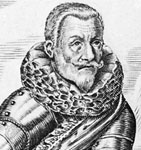Johann Tserclaes Tilly
|
 |
born February 1559, Tilly, Brabant, Spanish Netherlands
died April 30, 1632, Ingolstadt, Bavaria
outstanding Bavarian general who was the principal commander of the Catholic League in Germany during the Thirty Years' War.
Reared by Jesuits, Tilly gained military experience fighting in a Walloon regiment and at the siege of Antwerp (1585), serving under the Spanish Netherlands general Alessandro Farnese. In 1594 Tilly joined the Holy Roman emperor Rudolf II's army campaigning against the Turks.
Appointed by Duke (later Elector) Maximilian I of Bavaria to reorganize the Bavarian army (1610), Tilly created such an efficient army that it later became the backbone and spearhead of the Catholic League. At the outbreak of the Thirty Years' War (1618), he was made commander in chief of the field forces for the Catholic League. In 1620 he conducted the first campaign of the war and, after a series of successes, he marched on Prague to win the decisive Battle of the White Mountain (November 8) against the Bohemian Protestants. In the following years Tilly conquered the Upper and the Rhenish Palatinates and made himself the master of northwestern Germany.
In the war against Denmark (1625–29), Tilly, with the army of the Catholic League, crushed the Swedes at the Battle of Lutter (Aug. 27, 1626). After Gustav II Adolf invaded Germany (1630) and after General Albrecht von Wallenstein, the imperial commander, had fallen from power, Tilly acquired command of the imperial as well as the League forces (1630).
In 1631 Tilly laid siege to Magdeburg, strategically the most important point on the Elbe River and the base from which he hoped to check Gustav Adolf's advance into central Germany. On May 20, 1631, Magdeburg fell and went up in flames. The destruction of the city proved disastrous: it deprived Tilly of a base and of a source of food and shelter for his army, gave Swedish propaganda a powerful weapon, and branded Tilly as the “butcher of Magdeburg.?
Tilly, as commander in chief of both imperial and League armies, was seriously hampered by the political differences between the emperor and Elector Maximilian. Finally, acting on the emperor's orders, he invaded Saxony and was completely defeated at Breitenfeld (Sept. 17, 1631), thus opening up southern Germany to the Swedes. Gustav Adolf marched into the heart of Germany, and Tilly, in an effort to prevent the Swedes from crossing the Lech River into Bavaria at Rain, was fatally wounded.
Copyright © 1994-2002 Encyclopædia Britannica, Inc.
![]()
Sources
- Encylopedia Britannica 2002, Expanded Edition DVD
Web





